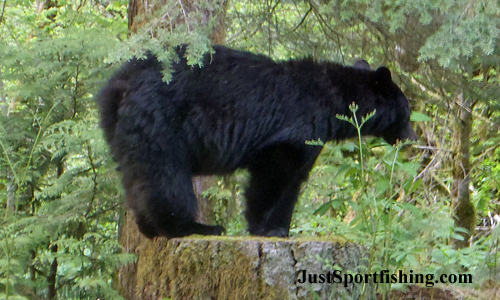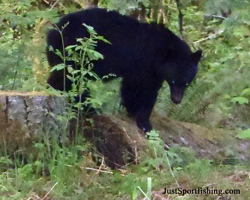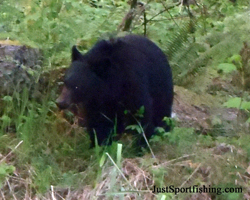|
|
Bear
Safety When
Fishing
I have decided to write this article as my son Joshua and one of his
friends have had close encounters with bears recently. I also have had
encounters with bears but the bears have always been a fair distance away. My
son who last weekend was hiking down a short trail that  leads to a lake
encountered the small black bear pictured in this article. My son paused and
took these photos when the black bear was still some distance away. The bear
then got down from the stump it was standing on and started towards Joshua. At
first Joshua stood still to see what the bear's intentions were. When the bear
kept coming in his direction Joshua started jumping up and down waving his arms
and yelling "GO BEAR GO BEAR" and the bear obliged and ran off into
the woods. My son's friend was charged by a large 300 pound black bear on the
upper Chilliwack River, (Near Vancouver, BC) knocked down and his roe bag pulled
from his fishing vest before the bear high tailed it into the woods. leads to a lake
encountered the small black bear pictured in this article. My son paused and
took these photos when the black bear was still some distance away. The bear
then got down from the stump it was standing on and started towards Joshua. At
first Joshua stood still to see what the bear's intentions were. When the bear
kept coming in his direction Joshua started jumping up and down waving his arms
and yelling "GO BEAR GO BEAR" and the bear obliged and ran off into
the woods. My son's friend was charged by a large 300 pound black bear on the
upper Chilliwack River, (Near Vancouver, BC) knocked down and his roe bag pulled
from his fishing vest before the bear high tailed it into the woods.
According
to the statistics that I found, from the year 2000 until now (2011) 14 people
have been killed by brown bears (grizzlies, brown, Kodiak) and 17 people have
been killed by black bears, including a 5 month old infant that was taken from
her stroller in Fallsburg, New York. These are the statistics for fatalities,
many more bear attacks happen every year but the people survive. Fishermen
account for many of these attacks both fatal and non fatal. Fishermen
are often in bear territory and need to know the basic rules on how to avoid
confrontation with bears.
Rules for bear country
The following bear safety
information was gathered from a variety of different government sites and should
be considered good preventative advice but there are no guaranties against bear
attacks. You are on their turf and every bear has its own personality so always
be aware and be informed. 
-
Stay
alert. Keep an eye out for bears so you can give them plenty of room. Look
for recent bear sign such as tracks, scats,
fresh diggings or partly eaten fish. (If you see any of these, be especially
cautious.)
-
Make noise, especially when your visibility is limited. If a
bear hears you coming it will probably leave the area.
-
Gut your catch at
the shoreline, not at camp. Put the guts in the water. Pop the air bladder so
the guts will sink.
-
Try not to get fish odours on your clothes. Wash your
hands, knife and cutting board after cleaning the fish.
-
Keep your fish
cooler in your vehicle. If tenting, store fish and food away from your tent in
bear-resistant and odour-proof containers.
-
If approached by a bear, reel
in and leave the area, or cut the line if playing a fish.
-
Do not handle
roe used for bait on picnic tables. Wash your hands afterwards, do not wipe on
clothing.
-
Do not build fires or cook by the river's edge.
-
Fish with
a friend. Bears are less likely to be aggressive toward groups of people.
-
Always sleep in a tent or a camper, never under the stars. Do not camp by the
river or near berry patches or wildlife trails.
What to do if you happen on a
bear
The previous points were to help avoid bears but there are also rules for
when you actually come upon a bear. 
-
If spotted in the distance, do not
approach the bear. Make a wide detour or leave the area immediately.
-
If
you are in a park report your sighting to Park Rangers at the first opportunity.
If you are at close range, do not approach the bear. Remain calm, keep it
in view. Avoid direct eye contact.
-
Move away without running. Running can
instinctually make the bear chase you.
-
If the bear is standing up, it is
usually trying to identify you. Talk softly so it knows what you are. If it is
snapping its jaws, lowering its head, flattening its ears, growling or making
'woofing' signs, it is displaying aggression.
-
If you are carrying bait or
your catch drop them and move slowly away. It may distract the bear and give you
more time. If it is an adult grizzly, consider climbing a tree. Remember black
bears and small or young grizzlies can climb trees and adult grizzlies can reach
12 feet up a tree.
-
Should a grizzly bear charge or attack do nothing to
threaten or further arouse the bear. Play dead. Grizzlies tend to defend
themselves when threatened. Assume the 'cannonball position' with hands clasped
behind neck and face buried in knees. Do not move until the bear leaves the
area.
-
If a black bear charges or attacks do not play dead. Be aggressive,
a black bear when threatened usually retreats to the forest or up a tree rather
than stand its ground.
-
If a Grizzly or Black Bear Attacks offensively
(including stalking you or when you are sleeping) Do not play dead. Try to
escape to a secure place (car or building) or climb a tree unless it is a black
bear. If you have no other option, try to intimidate the bear with deterrents or
weapons such as tree branches or rocks.
Bear deterrents
There are a number of
tools that can help you deter a bear, including bear spray, non-lethal
projectiles, and a variety of noisemakers. Used properly deterrents can be
helpful, but they're not 100% effective. Make sure you're familiar with their
use before you need them. And don't let deterrents give you a false sense of
security. Even in your tent, keep deterrents close at hand. Bear spray Bear
spray should only be used at close range on an aggressive or attacking bear.
Carry it ready to use, not in your pack. Before using it, ensure the nozzle is
pointed away from you. Exercise caution… If discharged upwind or in a confined
space, bear spray can affect or, in extreme cases, disable the user.

|
JustSportfishing.com

|

 leads to a lake
encountered the small black bear pictured in this article. My son paused and
took these photos when the black bear was still some distance away. The bear
then got down from the stump it was standing on and started towards Joshua. At
first Joshua stood still to see what the bear's intentions were. When the bear
kept coming in his direction Joshua started jumping up and down waving his arms
and yelling "GO BEAR GO BEAR" and the bear obliged and ran off into
the woods. My son's friend was charged by a large 300 pound black bear on the
upper Chilliwack River, (Near Vancouver, BC) knocked down and his roe bag pulled
from his fishing vest before the bear high tailed it into the woods.
leads to a lake
encountered the small black bear pictured in this article. My son paused and
took these photos when the black bear was still some distance away. The bear
then got down from the stump it was standing on and started towards Joshua. At
first Joshua stood still to see what the bear's intentions were. When the bear
kept coming in his direction Joshua started jumping up and down waving his arms
and yelling "GO BEAR GO BEAR" and the bear obliged and ran off into
the woods. My son's friend was charged by a large 300 pound black bear on the
upper Chilliwack River, (Near Vancouver, BC) knocked down and his roe bag pulled
from his fishing vest before the bear high tailed it into the woods.

